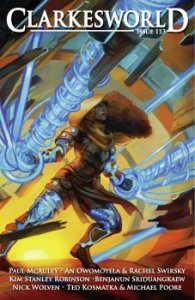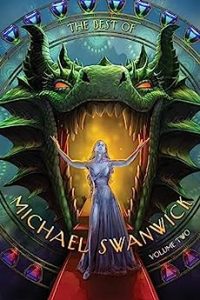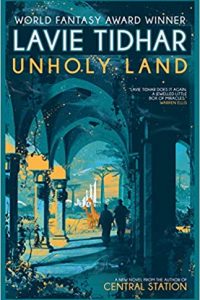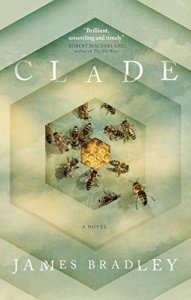Gardner Dozois reviews Short Fiction, April 2016
Clarkesworld 1/16, 2/16
Asimov’s 2/16
Interzone 1-2/16
 Clarkesworld is off to a good start in 2016, with two strong issues in January and February. (As a conflict-of-interest disclaimer, I’m the reprints editor for Clarkesworld, but since I have absolutely nothing to do with the selection of the original fiction, it seems like I ought to be able to get away with reviewing it as I would stuff from any other source.) The best story in the January Clarkesworld is Rich Larson’s ‘‘Extraction Request’’, a viscerally powerful, disturbing, at times even horrific, bit of military SF. It’s about soldiers crashed in hostile territory on an alien planet, and the protean alien creatures they struggle desperately to fight off… creatures that cannibalize the bodies of their fallen comrades in order to further attack them. The SF details of the future military tech that the soldiers use are ingenious and well worked-out, but what the story really delivers is gut-churning emotion, and, in fact, the story is nightmarish enough to qualify as technohorror. Also in January, Robert Reed’s ‘‘The Algorithms of Value’’ shows us that no matter how perfect a future utopia is, there’s always going to be somebody who’s dissatisfied with it. In ‘‘The Abduction of Europa’’, E. Catherine Tobler takes us to the outer Solar System to follow two stranded humans trudging across the endless icefields of Europa in a desperate attempt to get back to the station they came from before they freeze to death or run out of food and water. For much of its length, this is a people-struggling-to-survive-and-reach-safety-in-a-hostile-alien-environment story, or an Endurance Slog Story, a form that goes all the way back to stories such as H.B. Fyfe’s ‘‘Moonwalk’’ from 1952, but a transformational aspect eventually enters the story, and takes it in odd directions. It’s a bit foggy at times (I never did see a clear explanation of what the lost station was supposed to be, for instance), but rewards persistence. ‘‘Everyone Loves Charles’’ by Chinese writer Bao Shu, translated by Ken Liu, is a novella, a rare form for Clarkesworld, which usually tends to publish short stories and novelettes instead. It’s well written line-by-line, as is to be expected from something translated by as good a stylist as Liu, but takes much too long to cover pretty familiar ground: the man who prefers his illusionary cyber-fantasy life to the more disappointing reality of everyday life.
Clarkesworld is off to a good start in 2016, with two strong issues in January and February. (As a conflict-of-interest disclaimer, I’m the reprints editor for Clarkesworld, but since I have absolutely nothing to do with the selection of the original fiction, it seems like I ought to be able to get away with reviewing it as I would stuff from any other source.) The best story in the January Clarkesworld is Rich Larson’s ‘‘Extraction Request’’, a viscerally powerful, disturbing, at times even horrific, bit of military SF. It’s about soldiers crashed in hostile territory on an alien planet, and the protean alien creatures they struggle desperately to fight off… creatures that cannibalize the bodies of their fallen comrades in order to further attack them. The SF details of the future military tech that the soldiers use are ingenious and well worked-out, but what the story really delivers is gut-churning emotion, and, in fact, the story is nightmarish enough to qualify as technohorror. Also in January, Robert Reed’s ‘‘The Algorithms of Value’’ shows us that no matter how perfect a future utopia is, there’s always going to be somebody who’s dissatisfied with it. In ‘‘The Abduction of Europa’’, E. Catherine Tobler takes us to the outer Solar System to follow two stranded humans trudging across the endless icefields of Europa in a desperate attempt to get back to the station they came from before they freeze to death or run out of food and water. For much of its length, this is a people-struggling-to-survive-and-reach-safety-in-a-hostile-alien-environment story, or an Endurance Slog Story, a form that goes all the way back to stories such as H.B. Fyfe’s ‘‘Moonwalk’’ from 1952, but a transformational aspect eventually enters the story, and takes it in odd directions. It’s a bit foggy at times (I never did see a clear explanation of what the lost station was supposed to be, for instance), but rewards persistence. ‘‘Everyone Loves Charles’’ by Chinese writer Bao Shu, translated by Ken Liu, is a novella, a rare form for Clarkesworld, which usually tends to publish short stories and novelettes instead. It’s well written line-by-line, as is to be expected from something translated by as good a stylist as Liu, but takes much too long to cover pretty familiar ground: the man who prefers his illusionary cyber-fantasy life to the more disappointing reality of everyday life.
The February Clarkesworld is another strong issue. Best story here is probably ‘‘The Fixer’’ by Paul McAuley, which shows us an AI that has set itself up as a god over the deliberately degenerated population of a lost colony world, and the unexpected interrogation to justify its actions it suddenly comes under. It’s all told from the point of view of the AI, who proves quite human in the levels of rationalization and self-serving justifications it’s capable of coming up with. Clever stuff. Also excellent is ‘‘In the Midst of Life’’ by Nick Wolven, in which a corporate fixer runs into a big problem evicting squatters from an abandoned building which is about to be torn down to make room for a new one. Problems grow exponentially when he learns that the squatters have turned into a cult with a charismatic guru, and grow even worse when he himself begins to be swayed by some of the guru’s teachings. This one is somewhat longer than usual too, a long novelette if not a novella, and if this represents a trend for Clarkesworld to use longer stories, it’s one I heartily approve of, as long stories, particularly novellas, have long been the form best suited for the genre. ‘‘Between Dragons and Their Wrath’’ by An Owomoyela & Rachel Swirsky is a surreal fantasy in which the dragons are not much like the dragons usually encountered in fantasy literature, but rather beings who spread malign influences all around them, so that even coming near to where one has been can cause sickness and death – not too difficult a metaphor to figure out.
Much like the January Asimov’s, the February Asimov’s contains a lot of entertaining stories worth the reading, but nothing particularly outstanding. The best story here is probably Sean McMullen’s ‘‘Exceptional Forces’’, a sly and clever story about a genius reasoning with a female assassin who’s come to his hotel room to kill him; this one goes off in unexpected directions and is all the more satisfying as a result. Also good, although intensely sad, is Bruce McAllister’s ‘‘Bringing Them Back’’, in which someone in a near future destroyed by climate change lists all the creatures that used to share the planet with us but which now are gone forever, a list on which he includes himself as one of the last representatives of homo sapiens. In ‘‘The Charge and the Storm’’, An Owomoyela takes us to a world where human refugees from a crashed spaceship have been taken into enclosed cities by aliens (who themselves seem to be refugees from the surface of their own planet; victims of catastrophic climate change, perhaps? From a different planet altogether? It’s not entirely clear). The humans and aliens have reached a state of uneasy co-existence and equilibrium, although one that’s constantly threatened by human radicals who want to tip the balance toward human domination of the more technologically advanced aliens, and who aren’t afraid to use terrorist attacks to fulfill that end. This is the story of one woman who stands as both a bridge and a barrier between the two races. The protagonist is so insular, always preoccupied with problems and emotions that we might not understand at first, and the backstory complicated enough, that the story is a chewy read in places, particularly early on, but becomes compelling by the end.
Nick Wolven’s ‘‘Passion Summer’’ is an elegantly written story about a boy coming of age in a future where the artificial manipulation of emotions is possible. He must decide on who or what to select for his first Passion, an artificially created obsession that may enthrall him for the rest of his life; turns out that there are unexpected drawbacks to this process, especially when you come from a dysfunctional family where your mother has become addicted to these kind of neurochemical alterations of mental states.
‘‘The Monster of 1928’’ by Sandra McDonald is a nicely done story, full of authentic-seeming historical detail, about a flood that devastated the Everglades in the late ’20s; a not-terribly-formidable Cthulhu (one who’s capable of being challenged for dominance by an alligator) shows up later, but the story doesn’t really need him and could have been told as a straight historical period piece instead – except, of course, that then McDonald probably wouldn’t have any place to sell the story in the first place. Similarly, ‘‘In Equity’’ by Sarah Gallien is the story of an orphan anxiously awaiting placement in a new home, fearing that they won’t accept him. Except for a few unessential science fictional details, it could easily have been told as a straight mainstream story instead. And Michael Libling’s ‘‘The Grocer’s Wife (Enhanced Transcription)’’ examines the rather unconvincing idea of artificially generated Alzheimer’s disease.
The January/February issue of Interzone, #262, is a strong one, with more science fiction than usual, and a number of interestingly varied locations, different from the near-future British dystopia that I’ve come to think of as the default Interzone story. The best story here is probably Mercurio D. Rivera’s ‘‘The Water Walls of Enceladus’’, another in his Wergen series, in which a race of technologically advanced aliens are enthralled by the ‘‘beauty’’ of human beings and will do anything to remain worshipfully in their presence. This one is set on Enceladus, where a woman considered by humans to be spectacularly disfigured has self-exiled herself to do essentially meaningless scientific busywork with a colony of appreciative Wergen who devotedly follow her every move, something that has begun to get on her nerves. She tries to escape, and what happens next shows just what lengths the Wergen will go to in order to not be separated from their beloved. ‘‘A Strange Loop’’ by T.R. Napper, written in a loose, jazzy style that seems to be typical of Napper, if untypical of Interzone, is the story of a man who makes his living selling his memories, but decides he wants some of them back, reminiscent in some ways of the film Eternal Sunshine of the Spotless Mind; an entertaining piece, although I did wonder why his memories would be worth so much money, since they seemed mostly to be of trauma and unhappiness. ‘‘Empty Planets’’ by Rahul Kanakia is a meandering tale of a kid growing up in a prosperous, multi-planetary society who spends most of his life feeling that he is on the verge of coming up with a marvelous philosophical idea or insight, and then never actually comes up with one – which might make the story seem kind of pointless, except that I suspect that that pointlessness is the point. ‘‘Geologic’’ by Ian Sales sets up an intriguing situation on an alien planet where an ancient artifact has been discovered, and then abruptly ends the story without resolving anything, as if Sales had gotten tired of telling it. ‘‘Dependent Assemblies’’ by Philip A. Suggars is the issue’s only fantasy, dealing with the uses and problems of using a substance called ‘‘lux’’ that invests inanimate objects with life, rather like the Powder of Life in L. Frank Baum’s Oz books. It’s atmospherically written, but I always thought that fantasy stories seemed out-of-place somehow in Interzone, and this one seems especially incongruous surrounded by all the SF in the issue.





